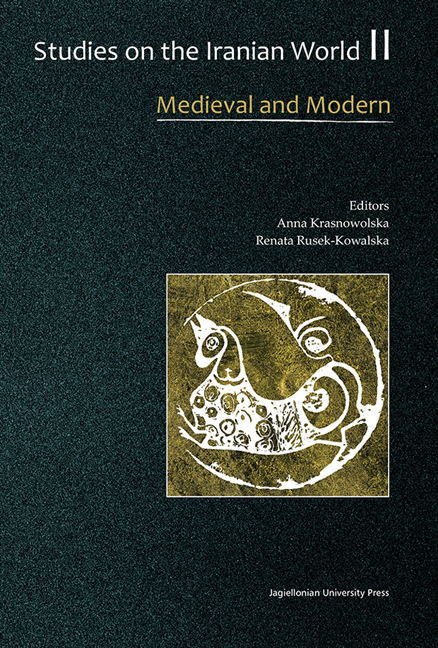Book contents
- Frontmatter
- Contents
- Foreword
- Linguistics
- Literature
- Timurid Authority and the Ottoman Sultan: Some Notes on Three Jāmi Manuscripts from the Library of Bayezid II (886–918/1481–1512)
- The Historical Novel in Early Modern Persian Literature
- Sibā-Zeynab-Zibā: the Metamorphoses of an Iranian Woman
- Laughing at Adultery in Persian Literature and Culture
- Quiet Lives and Looming Horrors – Subversive Narrative Strategies in the Earliest Short Stories of Zōyā Pīrzād
- Religion
- History
- Arts
- Social and Cultural Studies
Timurid Authority and the Ottoman Sultan: Some Notes on Three Jāmi Manuscripts from the Library of Bayezid II (886–918/1481–1512)
from Literature
Published online by Cambridge University Press: 12 January 2018
- Frontmatter
- Contents
- Foreword
- Linguistics
- Literature
- Timurid Authority and the Ottoman Sultan: Some Notes on Three Jāmi Manuscripts from the Library of Bayezid II (886–918/1481–1512)
- The Historical Novel in Early Modern Persian Literature
- Sibā-Zeynab-Zibā: the Metamorphoses of an Iranian Woman
- Laughing at Adultery in Persian Literature and Culture
- Quiet Lives and Looming Horrors – Subversive Narrative Strategies in the Earliest Short Stories of Zōyā Pīrzād
- Religion
- History
- Arts
- Social and Cultural Studies
Summary
SUMMARY
Interrelation between Timurids (1370–1506) and the Ottoman dynasty (1299–1923) was strong, especially in board of Timurid governor Ḥusayn Bāyqarā (1469–1510). Art and literature was developed in the epoch of Ḥusayn Bāyqarā in Hirat. The classic representative of Persian literature ‘Abd al-Rahman Jāmi (1414–1492) lived and created in Hirat's literary environment. Currently there are more than 1,200 manuscripts related to Jāmi's works copied in 15th–19th centuries in the manuscript fund of the library Sulaymaniya (Istanbul, Turkey). Relations between Hirat and Ottoman palaces were strong in Jāmi period too. The poets who came from Ottoman Empire to Hirat met with Jāmi and they carried away the manuscripts with their creative works to Istanbul. Three manuscripts with the personal seal of Bayezid II (1481–1512) of products of Jāmi are stored In Suleymaniya. It means that Bayezid II was especially interested in Jāmi's creative works.
This paper is based on my research on the influence of the Timurids (1370– 1506) on the Ottoman cultural milieu. The primary sources for this research come from various manuscript libraries in Istanbul. Although initially I thought that the scope of my research was not so extensive, it turned out that in several libraries of Istanbul there are more than 1,300 relevant manuscripts, i.e. works by major classical poets of the Timurid period, such as, ‘Abd al-Raḥmān Jāmi (817–898/1414–1492) and Mir ‘Ali-Shēr Navā’i (844–906/1441–1501). Therefore, I have restricted the analysis to manuscripts produced during the reigns of the Ottoman Sultans Fatih Sultan Mehmed, known as Mehmed II (856–886/1453–1481), and Bayezid II (886–918/1481–1512). This period roughly corresponds to the interval between the beginning of the reign of the Timurid Sultan – Ḥusayn Bayqarā – which lasted from 873/1469 until 911/1506 – and the death of his son Badi’ al-Zamān Mirzā in 920/1514 in Istanbul. It also roughly corresponds to the time of the most intensive creative activity of Jāmi and Navā’i.
It is commonly admitted that the Timurids made a significant impact in the cultural history of the Muslim world, and that Timurid period is characterized by a high level of development in science, art, and literature. Mutual relations between the Timurids and the Ottomans were established in the beginning of the 9/15th century, and personal contacts and travels were quite common.
- Type
- Chapter
- Information
- Studies on the Iranian WorldMedieval and Modern, pp. 59 - 72Publisher: Jagiellonian University PressPrint publication year: 2015



